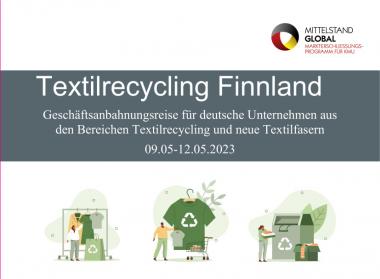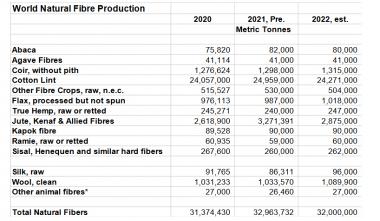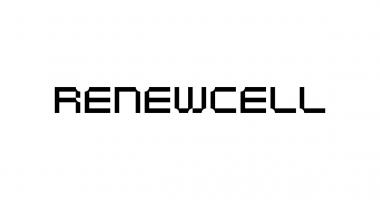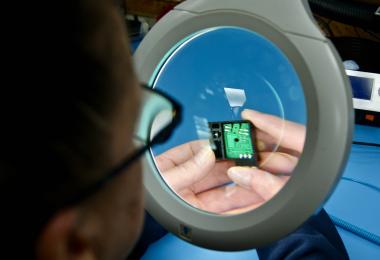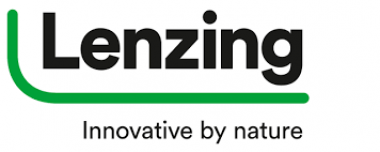Geförderte Geschäftsanbahnungsreise nach Finnland: Textilrecycling und neue textile Fasern
Die AHK Finnland führt in Kooperation mit der econAN international GmbH, dem bvse-Fachverband Textilrecycling e.V. und German RETech Partnership e.V. im Auftrag des Bundesministeriums für Wirtschaft und Klimaschutz, eine Geschäftsanbahnungsreise nach Finnland durch. Es handelt sich dabei um eine projektbezogene Fördermaßnahme. Sie ist Bestandteil der Exportinitiative Umwelttechnologien und wird im Rahmen des Markterschließungsprogramms für KMU durchgeführt. Zielgruppe sind vorwiegend kleine und mittlere deutsche Unternehmen (KMU).
Für die Projektteilnehmer*innen werden individuell auf ihre Anforderungen zugeschnittene Geschäftsgespräche mit potenziellen Kooperationspartnern, Kunden und Branchenexperten organisiert. In Vorbereitung auf die Geschäftsanbahnungsreise erhalten sie eine Zielmarktanalyse, die auf die relevante Branche, deren Marktentwicklung, Vertriebsinformationen sowie die rechtlichen und steuerlichen Rahmenbedingungen auf dem finnischen Markt eingeht. Im Rahmen einer fachbezogenen Präsentationsveranstaltung werden die deutschen Teilnehmer*innen die Möglichkeit haben, dem finnischen Fachpublikum bestehend aus Vertreter*innen der Wirtschaft, Verbänden, Verwaltung und Presse ihre Leistungen, Produkte und Technologien vorzustellen.
Für etablierte Unternehmen und Start-ups aus den Bereichen Textilrecycling und neue Textilfasern bieten sich viele Geschäfts- und Kooperationsmöglichkeiten auf dem finnischen Markt. Ebenfalls ist der finnische Markt interessant für deutsche Unternehmen, die Textilien in ihren Produkten nutzen und diese nachhaltiger gestalten möchten. Nachgefragt sind u.a. Lösungen für eine effiziente Sortierung von Textilien und für die Identifizierung von Textilarten, Innovationen für die Verwendung von recycelten Fasern, Recyclingtechniken sowie Maschinenhersteller. Deutsche Unternehmen dürfen mit einem großen Interesse an Kooperationen rechnen, denn die finnische Textilindustrie benötigt Partner in allen Phasen der Wertschöpfungskette.
Zielgruppe: Unternehmen aus den Bereichen Textilrecycling sowie neue textile Fasern. Die gesamte Wertschöpfungskette ist angesprochen – von Zulieferern von Maschinen und Rohstoffen bis zu Anbieter von Produkten aus recyceltem Material.
Inhalt: Die TeilnehmerInnen erhalten Unterstützung bei Markteintritt bzw. -bearbeitung in Finnland:
- Während einer Fachkonferenz präsentieren sie ihre Produkte und Dienstleistungen dem regionalen Fachpublikum (aus Wirtschaft, Politik und Verbänden).
- Zur Vorbereitung erhalten sie eine branchenspezifische Zielmarktanalyse mit Informationen zu den Marktpotenzialen und -entwicklungen, rechtlichen Rahmenbedingungen etc.
- Das Herzstück des Programms sind individuelle Termine mit Entscheidungsträgern und potenziellen Geschäftspartnern. Diese werden im Vorfeld für jedes Unternehmen durch eine individuelle Geschäftspartnersuche ermittelt.
Der Teilnahmebetrag liegt je nach Firmengröße zwischen 500€ und 1.000€ netto. Es können maximal 12 Unternehmen teilnehmen.
Weitere Informationen und zum Anmeldeformular online unter: https://www.econan.com/textilrecycling-und-neue-textile-fasern-in-finnland/
econAN international GmbH


